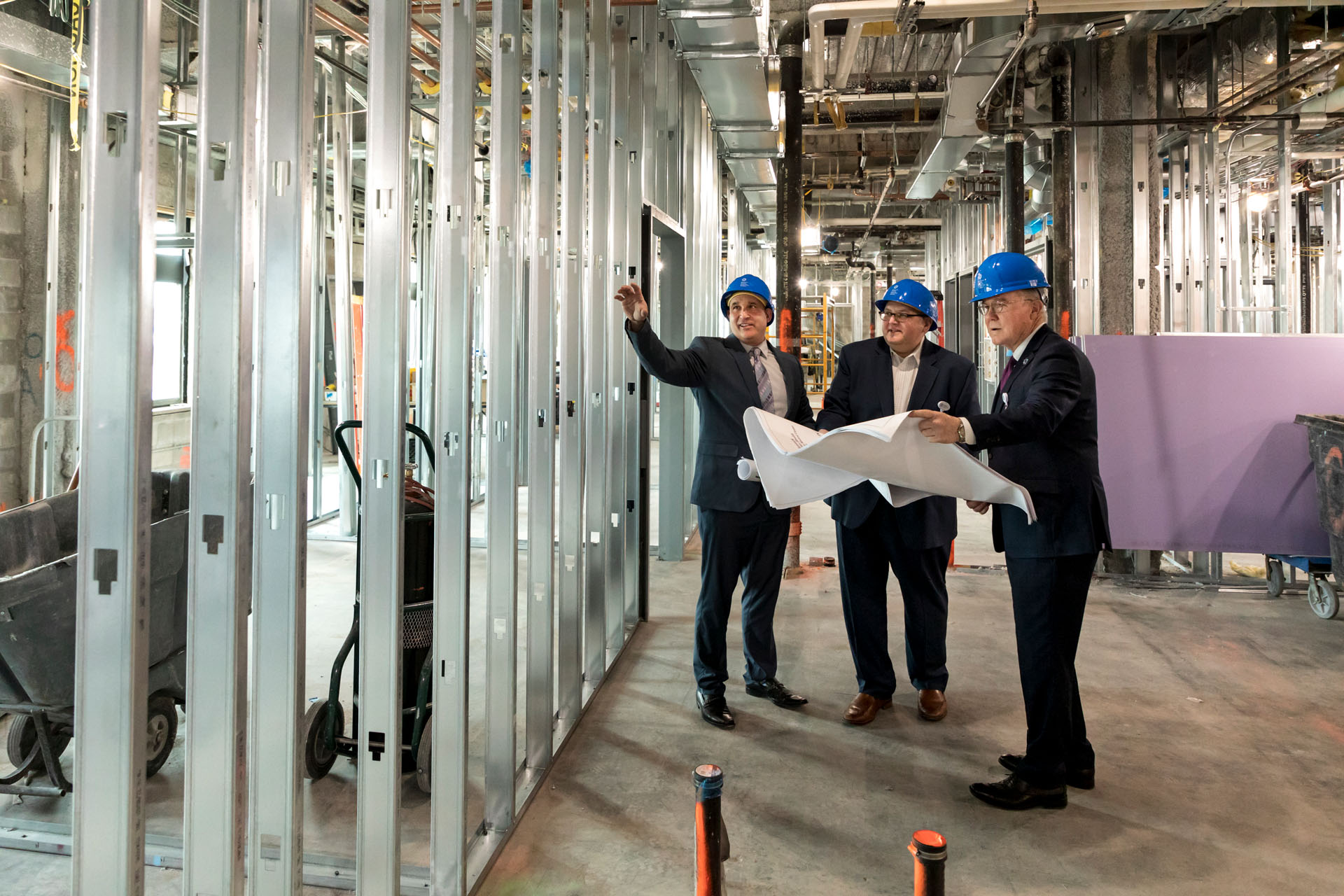NEW JERSEY LEADERS IN BEHAVIORAL HEALTH DESCRIBE THE URGENCY OF MENTAL AND EMOTIONAL WELLNESS CARE AND RESOURCES AS THE NATION EMERGES FROM THE PANDEMIC, AND THE MANY WAYS THE STATE’S LARGEST HEALTH CARE PROVIDER IS RESPONDING
BY AMANDA McCOY • PHOTOS BY AMESSE PHOTOGRAPHY
At the start of May a full 26 months after New Jersey Governor Phil Murphy declared a state of emergency in response to the rapidly escalating coronavirus crisis Garden State residents were living mostly free of the previously imposed pandemic-era restrictions. Public and private schools were back in session, non-essential businesses had long reopened, and limits on social gatherings were no longer in effect. But even as the country continues to move past the pandemic and life’s everyday activities resume as before, health care experts warn of another impending public health crisis facing the nation: a sharp increase in mental health related conditions.

“We’re experiencing a post-pandemic pandemic,” noted Donald J. Parker, president of Behavioral Health Care Transformation Services and Integrative Medicine at Hackensack Meridian Health. “In my 46 years of experience, I’ve never seen an accelerated amount of change in behavioral health demand and treatment like I have during the last two years. This crisis is affecting people across the board children, adolescents, adults, seniors and all have a unique set of challenges.”
Statistics show the nation is at a critical time for mental health. According to Parker, the number of adults who required psychiatric assistance rose annually from one in five to one in four from 2019 to 2020, and the numbers are even more alarming for children and adolescents. According to the CDC, from 2019 to 2020, mental health-related emergency department visits increased 24% for children ages 5 to 11 and a staggering 31% for those ages 12 to 17. In October 2021, the American Academy of Pediatrics declared that the pandemic related decline in child and adolescent mental health has become a national emergency.
“For children, their normal social growth has been impacted for the last two years,” explained Ramon Solhkhah, M.D., chair of the Department of Psychiatry and Behavioral Health at the Hackensack Meridian School of Medicine. “Human beings are social creatures; we need interactions and facial cues from those around us to learn. This is the foundation for building social skills, and all the activities necessary for emotional learning like in-classroom learning, spending time with friends, group sports and activities were taken away.” Dr. Solhkhah warned that while there has already been a notable increase in psychiatric conditions, health care practitioners still haven’t witnessed the full impact of the pandemic. “Over the next five to ten years, we are going to see a tsunami of mental health related issues,” he added.

Hackensack Meridian Health is responding to this anticipated need for more care and services. As part of an ongoing commitment to invest in the growth of its behavioral health services, HMH is currently in the midst of a multimillion-dollar expansion at Raritan Bay Medical Center in Perth Amboy. The expansion, scheduled to open in early 2023, will build out the center’s behavioral health wing with two state-of-the-art specialized units, one for geriatric care and the other for dual diagnosis patients, which will treat patients with both psychiatric and substance use disorder (addiction treatment) needs.
“Our strategy for growth and providing the services and care our communities need is the idea that we need to both centralize care, but also specialize to meet the unique needs of each population,” said Dr. Solhkhah. “In our geriatric subunit, we will treat patients over 60 in one place. We will create unique programming for our patients in the dual diagnosis unit. We will build our services in neuro modulation, Electroconvulsive Therapy (ECT) for severe depression, and severe psychosis. We will involve our residencies and fellowships to include our trainees in these programs.”
Another hallmark of the expansion is creating a facility that fosters wellness and tranquility. Parker noted that extensive research and thought went into the design aesthetic of the space, from the use of a warm, soothing color palette and open spaces with generous natural light to an expansive healing art collection.
“We are introducing spectacular living quarters with a truly comforting and healing environment, creating a new way for people to think about a psychiatric hospital,” said Parker, who also served as president of Carrier Clinic, a 296-bed dedicated behavioral health hospital in Belle Mead. “There are over 500 pieces of healing art inside Carrier Clinic, and we will be duplicating the healing arts initiative at RBMC. Healing art is a piece of art where you can place yourself in the picture, and it has meaning or an impact on you. It’s an influence you can’t underestimate. The facility will embrace the talented individuals that we have working for us doctors, nurses, and technicians and provide them with an environment where they too will feel healthy and comfortable.”

Hackensack Meridian Carrier Clinic, which specializes in inpatient psychiatric treatment and rehabilitation for substance abuse, is also undergoing an expansion, currently building a new specialized wing for children under the age of 12. These expansions join several strategic initiatives currently in place throughout the network, including the Wolf Lodge at Carrier Clinic, a co-ed residential treatment program for adolescent and teen residents between the ages of 13-18 who are experiencing co-occurring disorders; Project HEAL, an intervention program at Jersey Shore University Medical Center that provides immediate support for victims of violence; Retreat & Recovery At Ramapo Valley, an outpatient facility in Mahwah for substance abuse recovery; and a new model of care with Urgent Care with Behavioral Health in Neptune.
Another burgeoning crisis in the area of mental health care is the shortage of clinicians trained in behavioral health specialties. HMH is taking the lead in addressing this issue through the Hackensack Meridian School of Medicine by offering specialized fellowships in the field and training the next generation of physicians, including child and adolescent and addiction medicine fellowships, with more in the pipeline. “An important role for us as behavioral health leaders is to advocate and inform aspiring medical professionals to understand what a great thing it is to be able to help someone manage and improve their mental health,” said Parker.
For HMH, the focus on mental health includes prioritizing the mental health and well-being of each of its 38,000 team members. This has been an ongoing priority since before the onset of the pandemic, explained Parker. “We implemented a dedicated 24/7 support line and program for our care team called ‘WeCare’ before COVID-19. It is staffed with volunteers from our behavioral health team, who answer calls from their colleagues facing stressful challenges or traumatic events. If someone is experiencing stress, anxiety, or struggling in any way we connect them with services and resources to help them through it. This program existed before COVID, but has been even more critical through the historic challenges of the past two years. We offer a combination of integrated medicine, nutrition, exercise, Tai Chi, yoga, and other resources and services. We really created a safe zone for all our team members to talk to someone and know they were not alone and supported.”

Destigmatizing behavioral health needs continues to be a leading priority, concurred Parker and Dr. Solhkhah, but if they gleaned one silver lining from the pandemic, it’s the growing movement to eradicate and move past any shame associated with mental health and reluctance to seek care.
“One of the few blessings from the past two years is that the pandemic affected the emotional state of every person and family, and there is now a greater degree of understanding and acceptance in talking about mental health,” said Parker. “Our vision is for mental health to be part of our routine health care like going into your primary doctor’s office. You are going in for a medical service just like any other. People do not hesitate to seek care and treatment for diabetes, or a heart or other medical condition. Mental health is now increasingly being seen as what it is, an important part of overall health and wellness.”
“We were facing a crisis in mental health long before the pandemic,” added Dr. Solhkhah. “As a nation, we’ve been stressed out, overwhelmed, anxious, and depressed. At HMH, we prioritized addressing this long before the pandemic, and we’ve been committed to investing more resources into expanding our comprehensive behavioral health network for years. This is truly a national crisis affecting every state without a unified system of care. There are components of care, but it can be challenging for individuals and families to find and get care when they need it. We are doing our part to build up an infrastructure to support the needs of the residents of New Jersey, and increasing access and availability of care to all who need it. I’m very lucky to work in a health care network with leadership that is so passionately focused on improving the mental health of New Jersey residents.”

Raritan Bay Medical Center
530 New Brunswick Avenue, Perth Amboy
732.442.3700 / hackensackmeridianhealth.org
